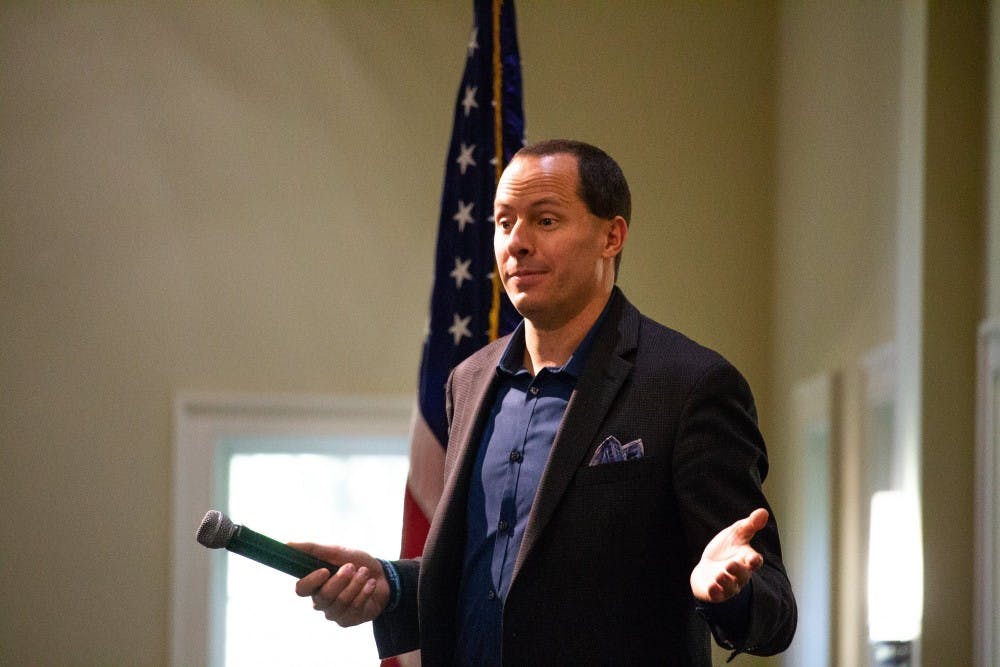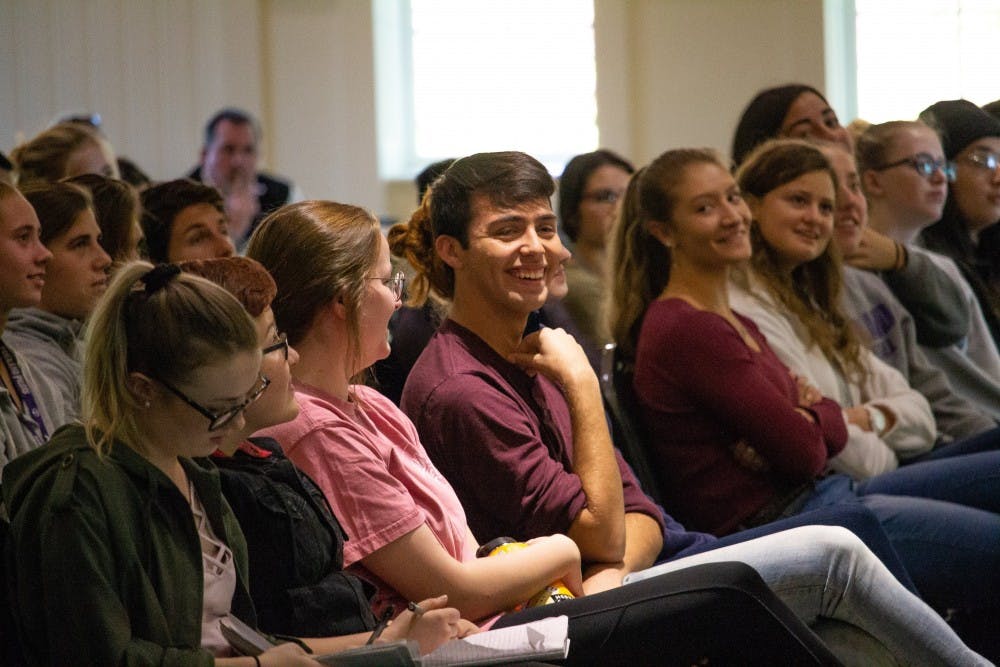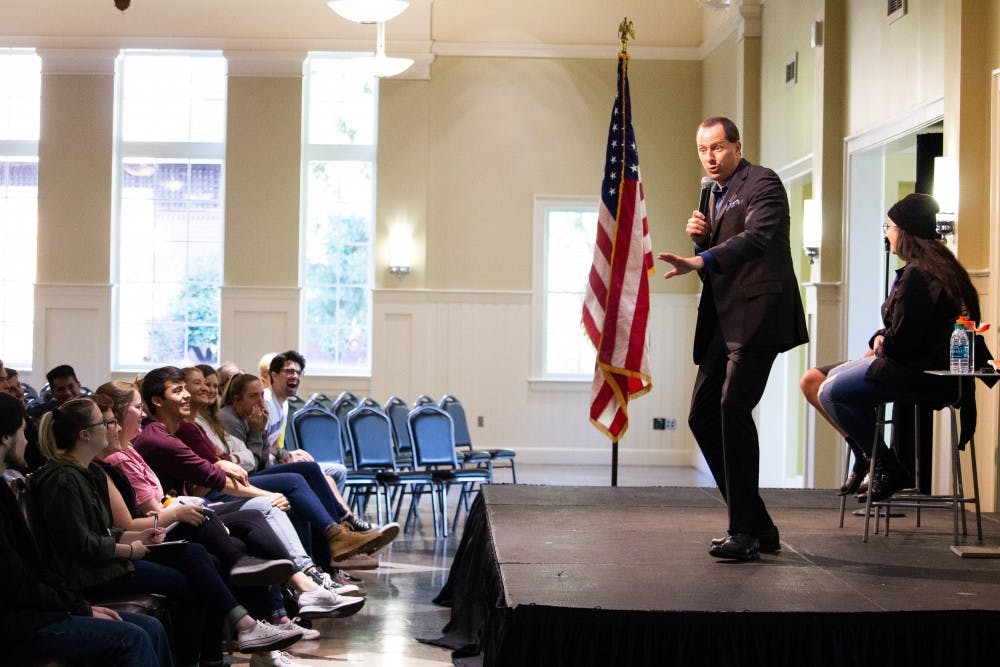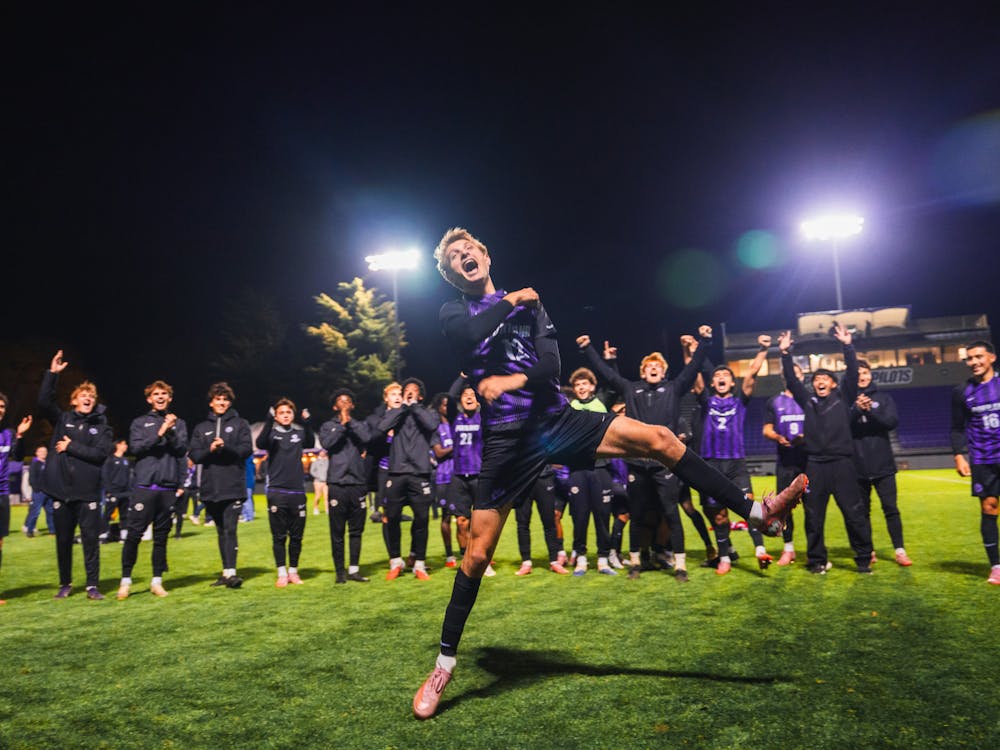Consent has been the focus of many discussions in American politics in recent years. With the growth of the #MeToo movement and the recent appointment of Brett Kavanaugh to the United States of America Supreme Court amid accusations of sexual assault, the issue of consent is more public than ever.
But what does consent look like?
This question was explored by Mike Domitrz, founder of The DATE SAFE Project, at an event called “Can I Kiss You” Wednesday afternoon. The talk was hosted by the athletics department, ASUP, student activities and the Title IX office in the quiet side of the Bauccio Commons. Around 70 people attended, including some UP staff members as well as students, according to Associate Athletic Director Jason Brough.
Domitrz used personal stories, roleplays with the audience and prize giveaways to demonstrate the importance of consent and strategies for bystander intervention and survivor support.
According to Domitrz, consent is enthusiastic, ongoing and in the moment. Consent is not coerced or attained through inebriation. He said it continues throughout all stages of sexual or intimate activity and ensures that each partner has to right to refuse at any moment, despite what they may have agreed to before.

During the event, Domitrz presented a fictitious but realistic scenario to give the audience an example of something a student may encounter.
Domitrz presented the following scenario, using fake names for the friends referenced:
Imagine you’re at a party. You see two of your friends, Jordan and Erin, talking. Jordan is giving Erin a lot of drinks but not having many themselves. You’re afraid Erin might get sexually assaulted. What do you do?
Domitrz said the first step to resolving this party situation is to recognize that Erin is a person, and frame what you say and do around that fact. Language has power and the words people use have an impact on how they act, he said.
“Humans do not fear confrontation if they believe it’s worth it,” Domitrz said.
According to Domitrz, when someone has intercourse while they’re too intoxicated to give consent, it needs to be called a sexual assault, rather than a “drunken hookup.”
When confronting the situation, Domitrz said you should approach Jordan with some friends, mention that Erin is visibly intoxicated and offer to get Erin home safely.
“When this person freaks out, you know you’re doing the right thing,” Domitrz said.
Once Jordan is identified as a “creeper,” Domitrz explained, no one else will want to talk to them. He said this not only protects Erin but everyone else at the party who Jordan might victimize.

Even when alcohol is not involved, consent is still vitally important.
“Body language is the most unreliable form of communication in sexual intimacy,” Domitrz said.
Searching for ‘the look’ (a non-verbal indication that someone is asking for a kiss), or playing guessing games is not a reliable way to find out if someone wants you to kiss them. Domitrz said that people have been taught for a long time to engage in intimate activities without asking.
According to Domitrz, the main reason people just ‘go for it’ is because they haven’t been taught how to ask others what they want.
Awkwardness won’t change someone’s answer, Domitrz said. Asking someone if they want a kiss shows maturity, eliminates guessing and better allows you to respect their choices.
The same rules apply to all types of intimate or sexual situations, he said. If someone is only focused on their partner saying ‘yes,’ then they’re not focused on what they really want. In these situations, Domitrz suggested asking your partner “what would you love for me to do in bed tonight?”
“If it’s not fun, someone's doing something wrong,” Domitrz said.

Because of his own personal experience, Domitrz said he has dedicated the last 27 years to speaking about these topics.
He started speaking a few years after his older sister was sexually assaulted during his first year of college. Domitrz said he came home to a note on his door telling him to call home. When he did, his mother asked if he was sitting down and told him his sister had been raped.
At the time, Domitrz said he didn’t know what to say. When his sister got on the phone four hours after her assault and asked him if he was okay, if he needed anything, her bravery amazed him.
And now almost 30 years later, Domitrz has this advice: If a loved one tells you they’ve been assaulted, thank them for sharing their experience, let them know how brave it was to do so, ask what you can do to help and listen.
Correction: An earlier version of this article reported that the event had around 30 students in attendance. According to a post-event survey conducted by Domitrz, there were around 70 people in attendance.
Sam Cushing is a reporter for The Beacon. He can be reached at cushing20@up.edu.








